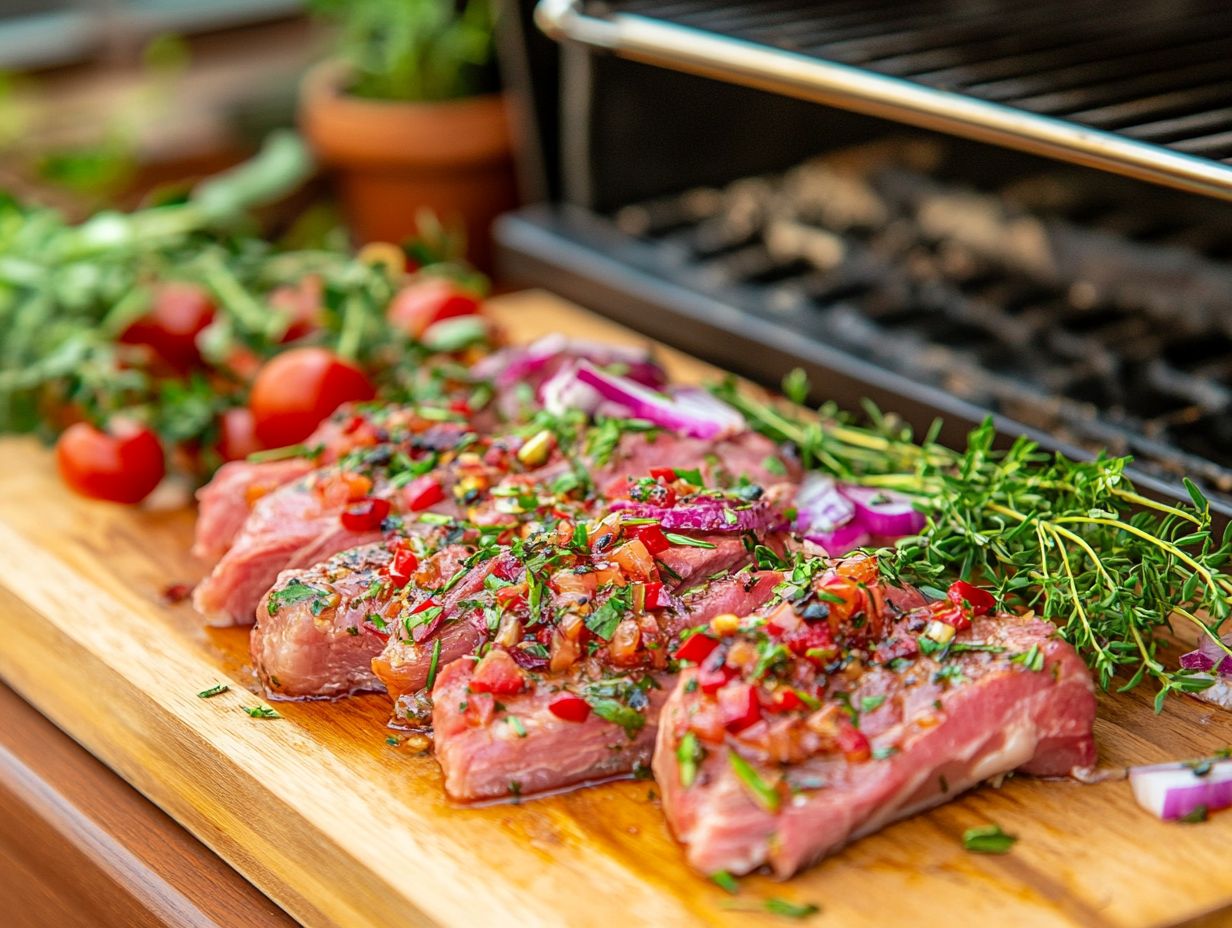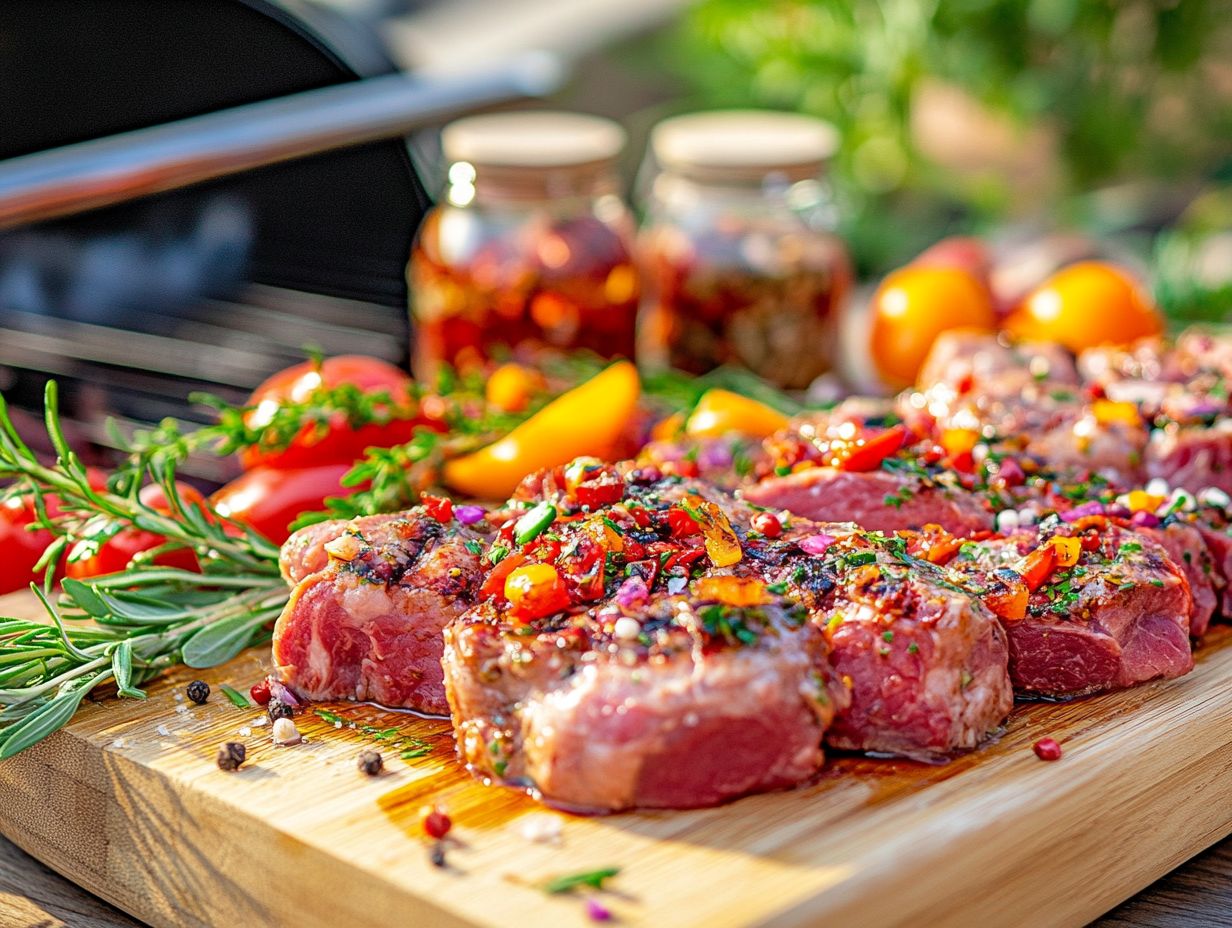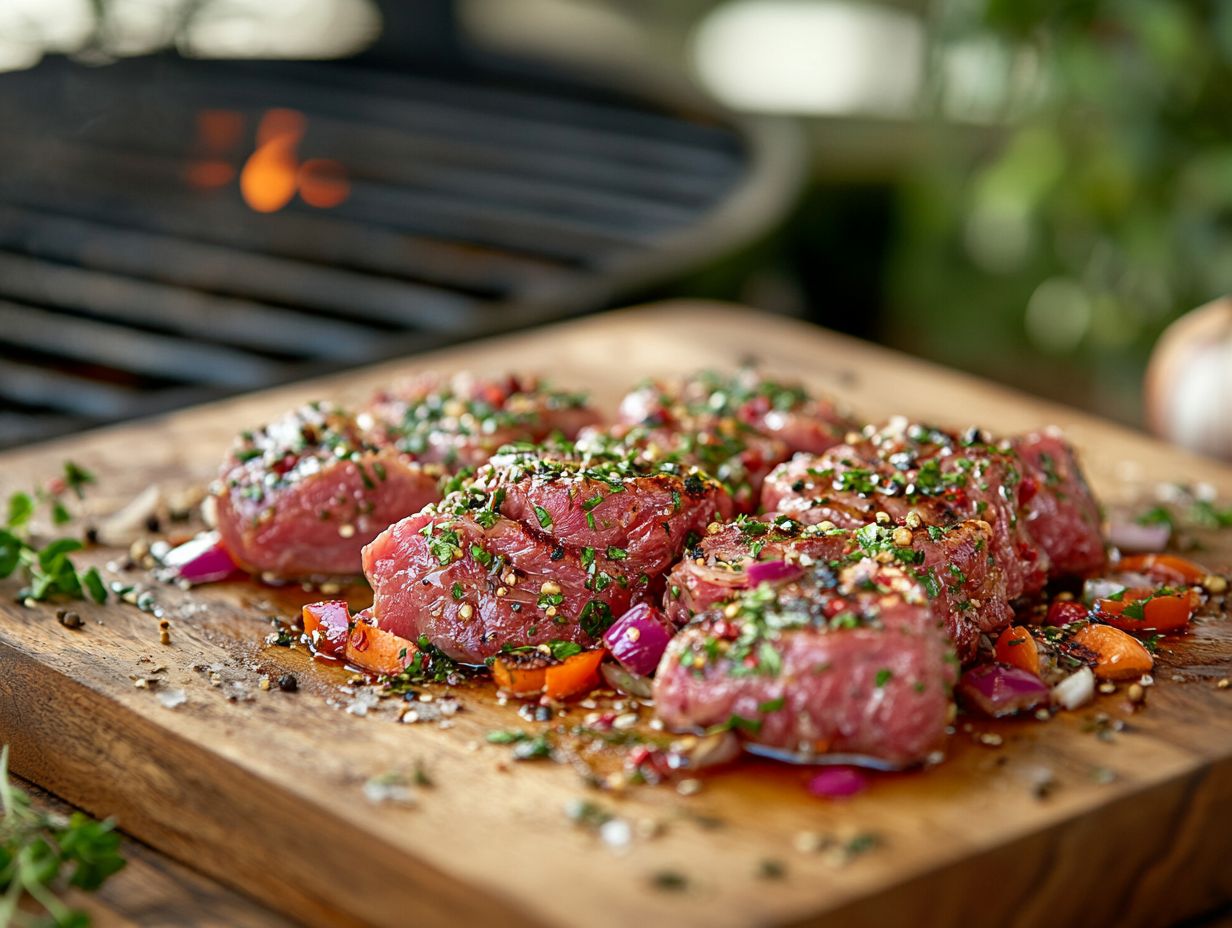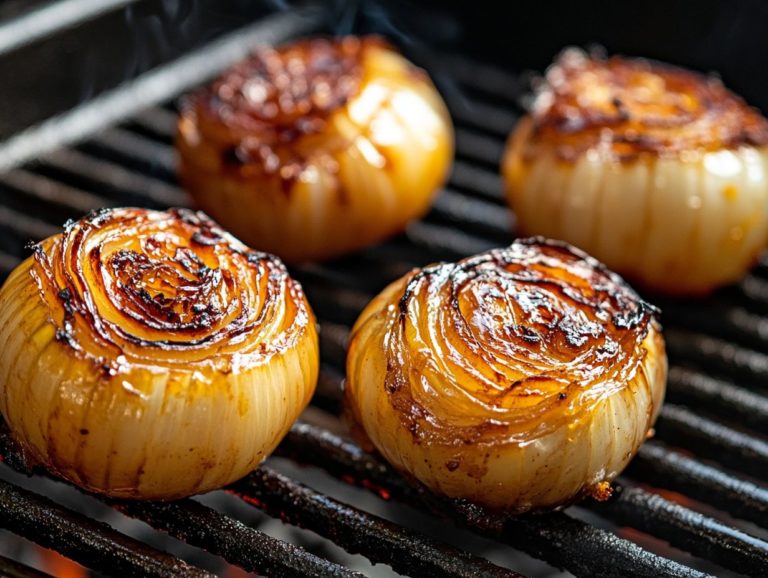Marinating Tips for Flavorful Grilled Meats
Let s dive in and transform your grilling game today! Marinating has the power to elevate your grilling experience, infusing meats with remarkable flavor and tenderness.
From selecting the perfect marinades to mastering the optimal marinating times for different cuts, this guide provides you with all the essentials for creating a truly delicious meal.
Delve into effective techniques that maximize flavor infusion and uncover crucial tips for grilling marinated meats to perfection.
Learn how to enhance your dishes with a great mix of herbs, spices, and acids. Prepare to impress both your palate and your guests!
Contents
Key Takeaways:

- Marinating is essential for flavorful and tender grilled meat.
- Choose the right marinade by considering factors such as protein, cut, and flavor preferences.
- Proper marinating times and grilling techniques ensure great flavor and safe cooking.
The Importance of Marinating
Marinating is an essential technique that takes your backyard barbecues to the next level, enhancing both the flavor and tenderness of meats like pork shoulder, chicken thighs, ribeye, and sirloin. For some inspiration, check out the best marinades for smoked meats.
This makes your dishes delicious and enhances enjoyment during summer gatherings. By crafting a proper marinade that artfully blends the right ingredients, spices, and acids, you not only boost the flavor profile but also ensure food safety through effective tenderization (making the meat softer and easier to chew).
This irresistible flavor balance perfectly complements those sunny gatherings with family and friends, making every bite a celebration.
How Marinating Enhances Flavor and Tenderness
Marinating elevates both flavor and tenderness, allowing you to let the meat soak up the marinade’s exquisite ingredients, typically a great mix of acid, oil, and spices.
The scientific processes involved are truly captivating; for instance, the acid in citrus juice or soy sauce works to break down protein chains in the meat, resulting in an irresistibly tender texture.
Similarly, spices like those in Grill Mates infuse your dish with a rich tapestry of flavors, transforming a simple meal into a memorable cooking experience.
When you grill or roast the marinated meat, these flavors reach their zenith, creating a delightful crust while keeping the inside juicy and succulent. This delightful interplay of acids and spices not only enhances the taste but also elevates your overall enjoyment of every meal.
Choosing the Right Marinade
Selecting the perfect marinade is crucial for achieving a great mix of flavors that enhances your choice of meats.
Whether you re grilling pork, chicken, beef, or a delightful medley of proteins for your upcoming summer backyard BBQ with friends and family, the right marinade will elevate your cooking experience to new heights.
Factors to Consider and Popular Options
When selecting a marinade, you should consider factors like the type of meat, the flavor profile you desire, and the ingredients think herbs, spices, oil, and acid that will elevate your BBQ experience.
For instance, different meats harmonize beautifully with specific marinades, so it s crucial to match the marinade with the protein you re grilling.
A robust cut of beef might demand a bold, savory marinade, while chicken could shine with a zesty citrus-based option that brightens its flavor.
Popular choices, such as the Asian Inspired Pow Pow Marinade, introduce umami elements through soy sauce and ginger, whereas citrus-based marinades offer refreshing notes that work wonders on fish and poultry.
Ultimately, finding the right combination can elevate your dish, inviting a delightful array of flavors that will satisfy any palate.
Marinating Techniques

Employing effective marinating techniques is essential for achieving the utmost flavor infusion.
With the right approach, your grilled meats whether pork, chicken, or beef will not only be incredibly delicious but also safe for enjoyment at your summer BBQ gatherings.
Best Practices for Maximum Flavor Infusion
To achieve maximum flavor infusion, follow some best practices, like using the right ratios of oil, acid, and spices in your marinade. Coat your meat thoroughly and give it ample time to marinate for the best results.
Using zip-top bags or covered containers simplifies clean-up and ensures even coverage of the marinade. Refrigeration is essential during marinating to prevent bacterial growth; never leave your meats out at room temperature.
Marination time varies depending on the type of meat. Chicken typically benefits from a few hours, while tougher cuts of beef can soak up flavors for a full day or even longer. Keep your marinating environment cool and dark to maintain the integrity of both the marinade and the meat.
Marinating Times for Different Meats
Understanding marinating times for various meats is crucial for ensuring they re flavorful and safe for your backyard BBQ. This knowledge helps determine the ideal duration for marinating pork, chicken, and beef, allowing you to achieve optimal taste and elevate your grilling experience.
Recommended Times for Different Cuts and Proteins
The ideal marinating times can differ significantly based on the cut of meat or protein. Precise guidelines are designed to enhance flavor.
Grasping these subtleties is key to achieving that coveted restaurant-quality experience in your own kitchen. For example, a ribeye steak thrives with a brief marination of about 30 minutes to 2 hours. This lets the flavors burst into the meat without overshadowing its natural richness.
In contrast, a hearty cut like a New York strip benefits from marination of up to 4 hours, making it taste even beefier while ensuring tenderness.
Regarding chicken thighs, they relish a longer soak, anywhere from 1 to 8 hours, as the marinade creates a succulent, flavorful dish. Utilizing quick-reference charts can be a game changer for home cooks, helping you select the perfect marinating times for a variety of cuts.
Tips for Grilling Marinated Meats
When grilling marinated meats, adhering to the right cooking temperatures and techniques is essential. This attention to detail ensures that your BBQ efforts are bursting with flavor and safe for your summer gatherings.
Proper Cooking Temperatures and Techniques

Proper cooking temperatures are vital when grilling marinated meats. Each cut be it pork, chicken, or beef should reach a safe internal temperature while retaining its juicy flavor.
Achieving the right doneness elevates taste and guarantees food safety, preventing harmful bacteria and preserving the meat s moisture. For example, grilling beef to medium-rare is ideal; use a meat thermometer to monitor internal temperatures. Chicken should hit that critical internal temperature of 165 F, while pork should be cooked to 145 F.
Incorporating techniques like direct and indirect grilling enhances the flavor profile, adding depth through caramelization the browning process that adds a sweet, rich flavor and smoke. Mastering these methods creates unforgettable dishes that will impress anyone fortunate enough to partake.
Additional Flavor Enhancements
Alongside marinating, dive into additional flavor enhancements like fresh herbs, spices, and acids. These elements can truly elevate your grilled meats, infusing them with complexity and richness that will transform your backyard BBQ into a culinary masterpiece. Don’t miss the chance to make your BBQ unforgettable!
Incorporating Herbs, Spices, and Acids
Incorporating herbs, spices, and acids into your grilling process can truly elevate the flavor profile of your marinated meats, transforming your summer gatherings into a vibrant and memorable dining experience.
By seamlessly blending fresh herbs like rosemary and thyme with spices such as smoked paprika or cumin, you can create a rich and tasty mix of flavors that dances on the palate. Adding acids like vinegar or citrus juice not only tenderizes the meat but also introduces a refreshing zest. For example, a marinade of lime juice, garlic, and cilantro pairs beautifully with chicken, while a mixture of balsamic vinegar, rosemary, and black pepper enhances the richness of beef.
These combinations not only amplify taste but also add an appealing visual contrast to your grilled dishes, compelling your guests to savor every delightful bite.
Frequently Asked Questions
What are the benefits of marinating meats before grilling?
Marinating meats helps to add flavor and tenderness, making it more enjoyable to eat. If you’re wondering what is the best way to marinate meat for grilling, it also helps to keep the meat from drying out during cooking.
How long should I marinate my meats for?
The length of time for marinating varies depending on the type of meat. Generally, poultry and fish should be marinated for 30 minutes to 2 hours, while beef and pork can be marinated for 2-24 hours. Using a marinade rich in acid and oil helps to tenderize the meat, achieving the right flavor balance for delicious results.
Can I use the same marinade for different types of meats?
It is not recommended to use the same marinade for different types of meats. The flavors may not complement each other, and there is a risk of cross-contamination. Make a separate marinade for each type of meat, and experiment with various spices and seasonings for unique tastes, such as sweet and salty blends or something with a kick like sriracha.
Do I need to refrigerate marinating meats?
Yes, marinating meats should always be kept in the refrigerator to prevent bacteria growth. Make sure to keep your marinating meat apart from other foods to avoid cross-contamination, especially when preparing food for a Backyard BBQ. This is key to ensuring food safety while enjoying good weather with friends and family.
Try these tips at your next BBQ, and watch your guests rave about your delicious grilled meats!
Can I reuse marinade?
No, it is not safe to reuse marinade that has touched raw meat. Discard any leftover marinade and make a fresh batch next time.
If you want to explore different flavors, try marinades with honey, vinegar, or olive oil. These ingredients can elevate the taste of your grilled pork shoulder or ribeye.
Should I poke holes in the meat before marinating?
Poking holes in the meat is unnecessary. It can cause the marinade to soak in too quickly, leading to uneven flavor.
Keep the meat intact while marinating. For example, chicken thighs or New York strips will absorb flavor well thanks to their natural juices.






